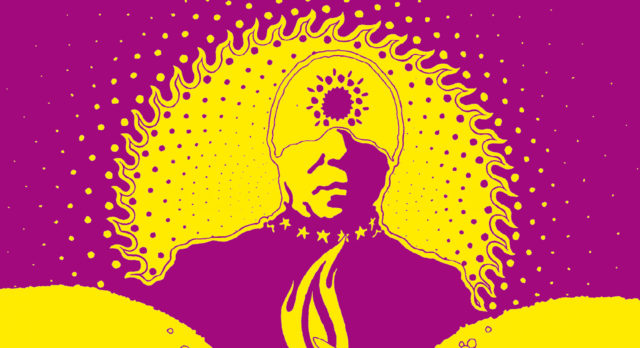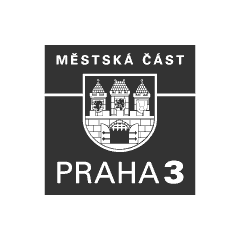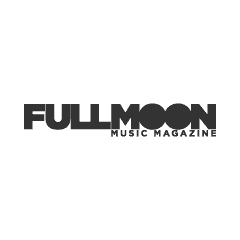The Sun Ra Arkestra has imperturbably maintained the grand tradition of the legendary big bands of the Swing Era. But the star-studded cast of the fourteen-piece orchestra is also ready to blast off any time to any sphere of sound, true to their motto “space is the place”.
The Sun Ra Arkestra’s steadfast spirit of freedom and creativity, its innovative strength and exuberant enthusiasm inspired about 3,000 listeners at the ZXZW festival in Tilburg, the Netherlands. As “Artists in Residence”, the Arkestra performed on five evenings at the Paradox Music Club from September 15th to 20th. Each of these concerts appeared to be a Big Bang. Live at the Paradox was recorded on the very last evening of this memorable concert series, combining jazz history and immortal myth. Founded in 1954 by piano genius, master composer, arranger and mystic visionary Sun Ra, the Sun Ra Arkestra continues to be an important stimulus and source of inspiration. Sun Ra himself remains an unfathomable paradox. Still, at the end of the Forties, before he replaced history with mystery, before he created a biography in its own right and abandoned his earthly name, Herman Poole Blount, to turn into the living myth, Sun Ra, he appeared as pianist and arranger in Fletcher Henderson’s Band. No more of this world however is Sun Ra. He was not born, but came to planet Earth from planet Saturn in 1914, to provide the musical message of deeper understanding and cosmic harmony for the benefit of humanity. The incredible biography legitimises itself through Sun Ra’s phenomenal life work, which remains untouched by genres and vogues. In the late Sixties Sun Ra was the first jazz musician to use the Moog-synthesizer for the futuristic sound. Sun Ra’s compositions are polyphonic masterpieces. His concept culminates in collective improvisations of highest concentration, celestially beautiful and occasionally explosive, like a supernova. Musicians such as John Coltrane drew inspiration from the Sun Ra Arkestra in the 1950s. Rock bands such as Sonic Youth and the MC5, or more recently the Shibusashirazu Orchestra, Tokyo’s leading avant-garde jazz ensemble, have been inspired by the Arkestra’s creativity. Even sixteen years after the legendary bandleader’s return to planet Saturn in 1993, his myth is alive and as vivid as ever. Since 1995 the 85-year-old master saxophonist and multi-instrument Marshall Allen has continued the musical mission. Before the baton was passed on to Marshall Allen, he had been conducting the Arkestra’s reed section for more than 30 years. His eruptive alto-saxophone is one of the most prominent voices in jazz and the signature of the cosmic sound. Whatever Sun Ra was capable of achieving on the Moog-synthesizer, Marshall Allen is ready to enhance with the E.V.I. – the Electronic valve instrument. Marshal Allen’s exceptionally gifted and amazingly energetic hand has not only consistently continued Sun Ra’s work with the Arkestra, but has also developed it with original compositions. Unparalleled, the Sun Ra Arkestra thereby has perpetuated a major element of Afro-American culture – that is to hand on the musical legacy from musician to musician.
Live at the Paradox leads straight into this germ cell of musical evolution. The stunning repertoire goes from the roots of jazz to the apex of avant-garde. Long-standing members of the band, like tenor saxophonist Charles Davis, can be heard alongside the promising voices of the next generation, represented by Wayne Anthony Smith Jr. (dr) and Farid Barron (p), with whom the piano comes into its own for the first time ever since Sun Ra’s departure. How does it sound, if one travels in this sound-time-ark from the future, and cracks the sound barrier of a bygone era, to debark in the middle of right now? Marshal Allen’s “Space Walk” is the tableau on which the sound voyagers introduce themselves. Called up by the percussion instruments, their voices appear from out of space, in order to share episodes with each other and again to release. The timing of drums, bass and piano earmarks large sections of the music and sets up the breathtaking tempo of the musical encounters. Finally the Arkestra performs a precision landing, with all voices perfectly together. Sun Ra’s oeuvre is imbued with “Discipline”. Quite a few serially numbered compositions can be tracked, which he entitled correspondingly. The early 1970’s version “Discipline 27-B”, which is presented to the audience here, sounds enthrallingly ardent. Trumpet, trombone, tenor saxophone and piano solos come thick and fast. The “27-B” species shows ultimate discipline and flows into “I’ll Wait For You”, the hymn of the cosmic coup in the Paradox. “Dreams Come True” sounds like the fulfilling of the promise, when Charles Davis, who was already Sun Ra’s companion in the Mid-Fifties, captivates with his solo.
Tenderly and tastily, he recalls the Arkestra’s past in Chicago. A masterpiece of the Chicago period, first published in “Jazz in Silhouette” in 1958, the lively “Velvet” starts here from brilliantly free, tonal cadence piano movements into a vamp, which remains in motion over the entire Arkestra, and lets solos gush out. In Marshal Allen’s sentimental ballad “You’ll Find Me”, Charles Davis again adopts the gentle tone, which Fred Adams (tp) and Farid Barron (p) emulate with their solos. As before in “Dreams Come True”, in Marshal Allen’s swinging “Millennium”, Cecil Brooks and Fred Adams do complement each other on the trumpet. But it is Marshal Allen, who points out all his strengths on the alto-saxophone here, velvety, energy-loaded and explosive. With “Take off” he actually performs a masterly take off on the E.V.I., accompanied by those subversive piano movements and those breathtakingly dynamic drums.
Look at the film Space is the Place
The composition explodes to collective uproar, able to tear down the walls of Jericho. After this cosmic Big Bang intermezzo, “Hocus Pocus”, Fletcher Henderson’s big band classic, appears with authentic casualness. Muted trumpets catapult it into the sound of the Roaring Twenties. Soon, the listener is guided back into the timeless world of the mythic musician Sun Ra by Farid Barron on the piano in “Space Idol”, and the Sun Ra Arkestra under the direction of Marshall Allen blasts off on inter-planetary music’s speedway.

















